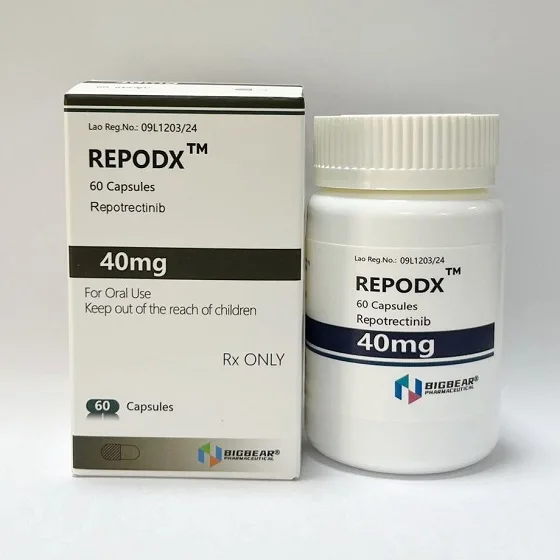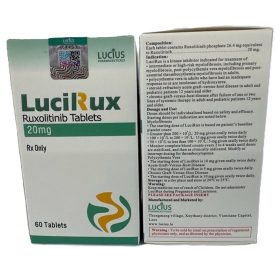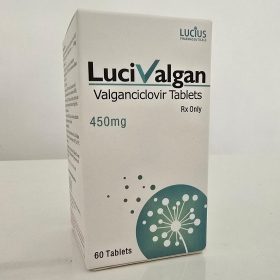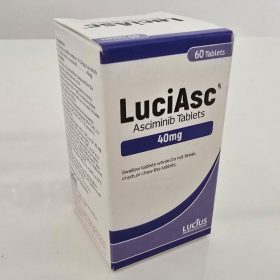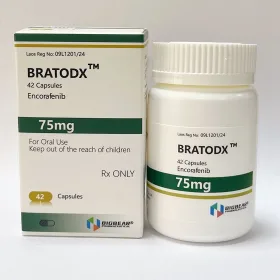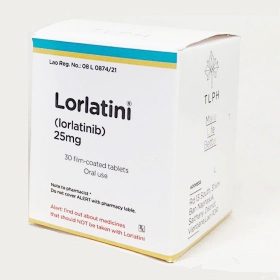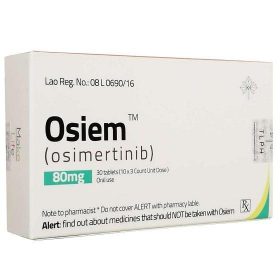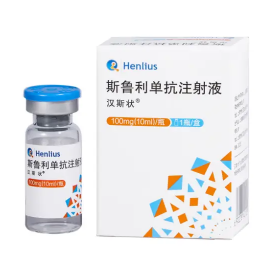- Details
- Description
-
Packaging Size60c
-
Strength40mg
-
CompositonRepotrectinib
-
Treatmentadvanced or metastatic ROS1-positive non-small cell lung cancer (NSCLC), NTRK Fusion-Positive Solid Tumors
-
Formcapsule
-
BrandREPODX
-
Quantity Unit40mg*60c/Bottle
-
ManufacturerBIGBEAR Pharma,Laos PDR
About Repotrectinib
Repotrectinib is an anti-cancer medication used for the treatment of non-small cell lung cancer. It is taken by mouth. Repotrectinib is an inhibitor of proto-oncogene tyrosine-protein kinase ROS1 (ROS1) and of the tropomyosin receptor tyrosine kinases (TRKs) TRKA, TRKB, and TRKC.
Non-small Cell Lung Cancer
Indicated for locally advanced or metastatic ROS1-positive non-small cell lung cancer (NSCLC)
160 mg PO qDay for 14 days, then increase to 160 mg PO BID
Continue until disease progression or unacceptable toxicity
NTRK Fusion-Positive Solid Tumors
Indicated for locally advanced, metastatic, or inoperable (surgical resection likely to result in severe morbidity) solid tumors with a neurotrophic tyrosine receptor kinase (NTRK) gene fusion that have progressed following treatment or have no satisfactory alternative treatment options
160 mg PO qDay for 14 days, then increase to 160 mg PO BID
Continue until disease progression or unacceptable toxicity
Dosage Modifications
Dose reductions for adverse reactions
-
Current dose is 160 mg PO qDay
- First dose reduction: 120 mg PO qDay
- Second dose reduction: 80 mg PO qDay
-
Current dose is 160 mg PO BID
- First dose reduction: 120 mg PO BID
- Second dose reduction: 80 mg PO BID
Central nervous system effects
- Intolerable grade 2: Withhold until grade ≤1 or baseline; resume at same or reduced dose, as clinically appropriate
- Grade 3: Withhold until grade ≤1; resume at reduced dose
- Grade 4: Permanently discontinue
Interstitial lung disease (ILD)
- Suspected ILD: Withhold
- Confirmed ILD: Permanently discontinue
Hepatotoxicity
- ALT or AST >3x ULN with concurrent total bilirubin >1.5x ULN (without cholestasis or hemolysis): Permanently discontinue
-
Grade 3
- Withhold until grade ≤1 or baseline
- Resume at same dose if resolves within 4 weeks
- Recurrent grade 3 that resolves within 4 weeks: Resume at a reduced dose
-
Grade 4
- Withhold until grade ≤1 or baseline
- Resume at reduced dose
- Reaction does not resolve within 4 weeks OR recurrent grade 4: Permanently discontinue
Creatine phosphokinase (CPK) elevation
-
Withhold until resolves to baseline or ≤2.5x ULN, then
- CPK elevation >5x ULN: Resume at same dose
- CPK elevation >10x ULN or second occurrence of CPK elevation >5x ULN: Resume at reduced dose
Hyperuricemia
- Grade 3 or 4: Withhold until signs and symptoms improve, then resume at same or reduced dose
Other significant adverse reactions
- Intolerable grade 2 or grade 3 or 4: Withhold until grade ≤1 or baseline
- Resolves within 4 weeks: Resume at same or reduced dose
- Does not resolve within 4 weeks: Permanently discontinue
Renal impairment
- Mild-to-moderate (eGFR 30-90 mL/min): No dosage adjustment necessary
- Severe (eGFR <30 mL/min) or patients on dialysis: Dosage guidance not provided; pharmacokinetic data unknown
Hepatic impairment
- Mild (total bilirubin >1-1.5x ULN or AST >ULN): No dosage adjustment necessary
- Moderate or severe (total bilirubin >1.5x ULN with any AST): Dosage guidance not provided; pharmacokinetic data unknown
Dosing Considerations
Before initiating
- Discontinue strong or moderate CYP3A4 inhibitors for 3-5 half-lives of CYP3A4 inhibitor
- Evaluate liver function tests and uric acid levels
- Verify pregnancy status of females of childbearing potential before initiating
Patient selection
-
NSCLC
-
Verify presence of ROS1 rearrangements in tumor specimens
-
-
Other solid tumors
- Verify presence of NTRK1/2/3 rearrangements in tumor specimens
- Consider treatment without confirmation of NTRK1/2/3 rearrangements in patients with secretory breast cancer or mammary analogue secretory cancer

